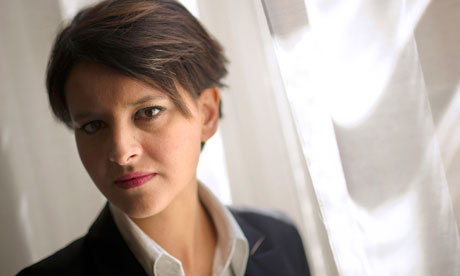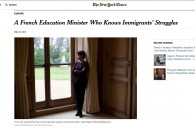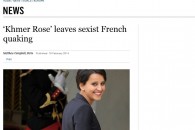
The 34-year-old is known as the “face” of the new French government. She is both minister of women’s rights – a post resurrected after decades of absence – and government spokesperson, handpicked to embody Hollande’s reforms and firefight on the media frontline. In a country still shellshocked by a divisive election campaign, marked by the rise of the far right and its anti-immigration discourse borrowed by Nicolas Sarkozy, Vallaud-Belkacem’s appointment is symbolic. It is also part of a much-demanded reshaping of government. France’s new cabinet, with 50% women, is doing far better than the European average of 26% women, and in particular the UK, which has five women out of 23 cabinet members. In addition, 20% of the new French cabinet are from ethnic minorities (seven ministers out of 34), compared with just one minister in Cameron’s cabinet: Lady Warsi.
Born in rural Morocco, Vallaud-Belkacem arrived in France, aged four, with her mother to join her father, a construction worker. The second of seven children, she grew up on a poor estate on the outskirts of the northern town of Amiens in the Somme. Her parents, as foreigners, didn’t have the right to vote, and the family didn’t talk politics, except to tut when the far-right Jean-Marie Le Pen appeared on television. Vallaud-Belkacem “flourished” at school, as she puts it, swayed as much by Voltaire’s Zadig as the Berber songs of her parents. She got French nationality at 18. With scholarships, she studied at France’s Institute of Political Science and worked as a jurist. But when in 2002, Le Pen shocked France by getting through to the final round of the presidential election, knocking out the Socialists, she felt she had to go into politics. Elected councillor in Lyon and rising up the ranks of Lyon’s town hall and the Socialist party, she found herself on a plane in 2006 with Ségolène Royal, then running to be France’s first woman president. She offered to help Royal, who made her her spokesperson. This year, Hollande gave her the same post in his own presidential campaign.
She was shocked when, after she was appointed to government, the right and far right attacked her as a threat because of her double French and Moroccan nationality. “For 10 years I’ve been totally engaged in serving the public good. I feel totally French – I don’t feel half-French because of my dual nationality. For me, dual nationality just means I don’t deny my roots,” she says.
Now her desk is piled high with the latest tricky dossiers on equality rights. When Hollande appointed equal numbers of men and women to the French government for the first time, and then gave Vallaud-Belkacem prominence as women’s rights minister, the stakes were high. Feminist groups in France are increasingly vocal, clear that they won’t put up with persistent inequality on pay, family issues or sexual harassment. Since the 2011 arrest in New York of the one-time Socialist presidential hopeful Dominique Strauss-Kahn on criminal charges of alleged attempted rape against a hotel housekeeper, which were later dropped, there has been a public outpouring over sexism and harassment issues in France. Strauss-Kahn, who denies the allegations, still faces a civil suit in New York and and is under investigation for alleged complicity in pimping in a prostitution-ring inquiry in Lille. Non-stop media coverage has opened the debate on sexism and macho culture, and it won’t go back in its box.
Vallaud-Belkacem says she was often “observed like something from another planet” in her 10-year political career. She has never been sure whether that was down to her age (at 34 and in government, she is still 20 years younger than the average French MP), gender or foreign roots. In a book this year, Raison de Plus, she described hosting an election campaign dinner at home in Lyon. She opened the door and took a guest’s coat to find him looking around for Madame Vallaud-Belkacem, shocked that it was her. “Still today in our society a young woman with dark skin who opens the door in a bourgeois area must be a domestic,” she wrote.
She has fought to dodge the ethnic diversity pigeonhole in politics. “When I started out, it was rare to see elected representatives with foreign roots. Often I was relegated to my origins, put in the diversity box: ‘You’re the new face of diversity.’ That annoyed me, because I always felt French, and suddenly I was being made to feel I wan’t as French as others.” Aware of the argument that someone like her would “do well” in elections in “towerblock constintuencies”, she deliberately always fought for election in right-wing areas, worked on topics not linked to ethnicity, such as gay rights and bio-ethics. She now feels she has undone that label. “I’m no longer reduced to it. I’m seen as a politician in my own right, without having to qualify that I’m from France’s [ethnic] diversity.”
But hanging over her head is the persistent comparison with Rachida Dati, the one-time justice minister, whom Sarkozy made his own symbol of ethnic diversity. A magistrate and daughter of Moroccan and Algerian immigrants, Dati was the first woman of North African origin appointed to government, dominating the celebrity magazines, before she very publicly fell from favour and grace. “There’s no comparison,” says Vallaud-Belkacem. A ferocious critic of Sarkozy, she concedes that his appointment of three women of foreign origin was important, “but at the same time it was hugely lacking, because he didn’t go out and find elected representatives with foreign roots who had earned their legitimacy on the ground, in grassroots politics: he found those close to him, or people who he made and later undid. That is the trap François Hollande hasn’t fallen into.”
Once described by French Elle as a “smiling and tireless bulldozer”, Vallaud-Belkacem’s first challenge as women’s minister is to rush through a new sexual harassment law. Last month, women’s groups took to the streets after France’s constitutional council scrapped existing legislation when a deputy mayor who had been convicted of harassing three employees complained the law was too vague. Ongoing cases were immediately thrown out of the courts, leaving what she called a “dangerous void”.
“We’re creating a criminal law which will cover a maximum of possible situations,” she said. Based on the European directive, all types of sexual harassment will be taken into account, inside and outside the workplace: from jokes, insinuation and gestures to leaving a pornographic magazine on someone’s desk. A victim will no longer have to prove that a harasser was trying to secure a sexual encounter. When there are clear demands for sex, such as someone demanding sex at a job interview or for a housing contract – examples of which have dominated recent French media coverage of the issue – a single incident can be enough to go to trial.
There has been a lot of soul-searching about the extent of sexual harassment in France. Vallaud-Belkacem says she doesn’t feel it’s a particularly French issue, or worse in France than elsewhere. She glances at a Europe-wide study from 1999, in which 40% of women in the EU said they had experienced it at least once. “This shows a certain similarity of behaviour across Europe,” she says. “But the fact the French law stayed so imprecise for so long, despite a strong mobilisation by women’s associations, is proof the powers that be didn’t sufficiently take it in hand. So we have to fight to end the feeling of impunity that persists in our country on this issue.”
When the Strauss-Kahn story broke, the media reported a kind of break in the omerta on sexual violence and sexism in general. Women politicians spoke out about sexism, some complaining they no longer felt comfortable wearing a skirt in parliament. Other cases were reported, including against the then right-wing UMP minister and mayor Georges Tron, now under investigation for alleged rape and sexual assault against staff, which he denies.
Does Vallaud-Belkacem think women’s issues have been marked by a “before and after DSK” moment? She says the growing feminist awareness dates back to before the New York arrest, but has been boosted by several events. “First in 2009, when Sarkozy cut funds to family planning, abortion clinics began closing, making life difficult for women who wanted an abortion – some had to go abroad. People began realising things they had taken for granted were not as straight forward as they thought, and there were demonstrations and a petition of 150,000 signatures. Then in 2010, Sarkozy’s pension reform left women 40% worse off than men, and women took to the streets again. Then the DSK case allowed greater visibility and discussion of behaviours French society rightly judged unacceptable.”
All this heaps pressure on Vallaud-Belkacem and Hollande to deliver their promises on equal rights. She will be able to vet all new laws in terms of women’s rights and gender equality. “Everything will be looked at through the prism of gender equality. If we see an imbalance, we will readjust it,” she said.
She is planning a major conference of experts on prostitution in France and Europe. “Since the 19th century and the role of Josephine Butler [the Victorian feminist], Britain and France have been the core countries in the international mobilisation against prostitution. I really hope that these common roots are still alive.” She hopes to meet Theresa May to open discussions on “how we tackle women’s issues together, such as prostitution and human-trafficking”.
On France’s persistent male-female pay gap, the first step will be to enforce the existing law, which is often ignored. France has set quotas on women’s presence in boardrooms at 20% by 2012 and 40% by 2017. Many big companies have already nudged over the 20% objective, proof that the law can “spur companies on”. But she thinks the solution is not just quotas at the top, but training and opportunities at the bottom, where women are often forced into part-time work and limited in career progress.
France is often viewed by its European neighbours as a beacon for childcare provision for young babies. “Compared to some of our neighbours, it’s not frowned upon to be a mother and work in France,” she said, explaining why France has Europe’s highest birth rate after Ireland. She says there’s still huge work to be done, and wants to end the taboo around paternity leave.
But in French politics, the personal is becoming the political, and Vallaud-Belkacem is conscious of the example she sets as a working mother. Married to a civil servant who has just been appointed to another ministry, she has three-year-old twins. With an election campaign and setting up a new ministry, her working hours have been nudging 7am to 11.30pm seven days a week.
“I’m aware that beyond my own need to find a personal balance, I should be sending a signal to society as women’s minister about the importance of work-life balance.” But how? “It’s difficult,” she says, jumping up for the next meeting, but resolved to carve out time.
Sur le même sujet
-
 “Une ministre française de l’Éducation qui connait les difficultés des immigrés” – Portrait du New York Times
“Une ministre française de l’Éducation qui connait les difficultés des immigrés” – Portrait du New York Times
-
 Portrait dans le Sunday Times
Portrait dans le Sunday Times
-
 New York Times : “La France à l’avant-garde de la lutte contre les discriminations faites aux femmes”
New York Times : “La France à l’avant-garde de la lutte contre les discriminations faites aux femmes”
Madame la ministre
bonjour Najat
Je suis satisfait que vous soyez regarder depuis l’etranger, comme “the new face of France”. Cela fait vibrer un brin de chauvinisme chez moi, à l’idée que l’image de la France à l’étranger, puisse être liée à vôtre manière de faire la politique. Je pense ne pas avoir ressentit les choses de cette façon depuis 1981.
Vôtre coté “buldozer” honnore l’esprit de la gauche qui tout au long de son histoire, a toujours joué le rôle de booster de la socièté pour engendrer les changements les plus significatifs. J’eusse aimé que cet esprit et se souffle fut présent dans tout le gouvernement.
J’espère que durant les cinq prochaines années l’on vous laissera poursuivre vos combats de la manière dont vous le faîtes.
L’on a vu trop souvent des personnalités soucieuses d’agir avec sincérité, être rattrapées par la réal-politique et réduites au silence, voir disparaître de la scène politique.
J’espère que vous serez celle qui permettra aux femmes de mieux exister dans nôtre socièté, notamment celle qui osera à nouveau enter en jupe à l’assemblée nationale lors des questions au gouvernement, sans que quiquonque n’ose encore se permettre la moindre remarque.
Je vous ai regardér hier soir dans l’emission de Yves Calvi; et ai particulièrement apprécié la manière dont vous avez géré le débat avec Mme Pecresse. Vôtre crédibilité et vôtre assurance vous permettent maintenant d’assurer un débat avec tous les grands noms de la politique sans être défaite.
Néanmoins je me suis demandé si cette crédibilité, ne risquait pas d’être atteinte par vôtre affirmation sur la disparition de la protitution.
Peut on rééllement poser ce débat de cette manière, lorque parmis vos détrateurs l’on compte des prostituées dont le mécontentement s’est exprimé sur les radios parisiennes ?
Pour ma part je pense que la prostitution doit être combatue, seulement dans les cas où elle est subie, et en proposant des alternatives de vie.
Certes il n’est pas concevable qu’une étudiante soit obligée d’avoir recours à ce moyens de gagner de l’argent pour payer ses études. L’on peut dire la même chose pour une mère célibataire en charge d’enfants etc on pourrait citer beaucoup de cas de même nature.
Mais une loi liberticide ne combattra pas la prostitution qui s’est toujours arrangée pour composer avec la loi et exister à coté de la loi. Et cela tout au long de nôtre histoire.
La prostitution si elle doit disparaître ne disparaîtra que de son inutilité, lorque les citoyens lui auront tourné le dos. Je n’ai pas le sentiment, compte tenu du rôle qu’elle joue dans l’appaisement de souffrances psychologiques et sexuelles dans notre société, que cela soit pour demain.
Cet idéal ne peut pas être le début d’une action, mais elle peut être la conséquence d’une transformation profonde de nôtre socièté. C’est aux causes qu’il faut donc s’attaquer.
Bien à vous
[…] Je blaguais,excellent article,merci beaucoup…!
[…] “Nul n’est prophète en son pays”.
[…] Chère Najat,tu dis vouloir supprimer la prostitution des femmes…! Comment…?
[…] Elles excercent ce métier non pas par plaisir mais par nécessité,c’est leur moyen de subsistance,une survie…!
[…] “La femme est obligée de choisir entre acheter un homme,ce qui s’appelle le mariage,ou se vendre aux hommes,ce qui s’appelle la prostitution”.Extrait du “Océan prose”,1864.
[…] Traduction,please…!